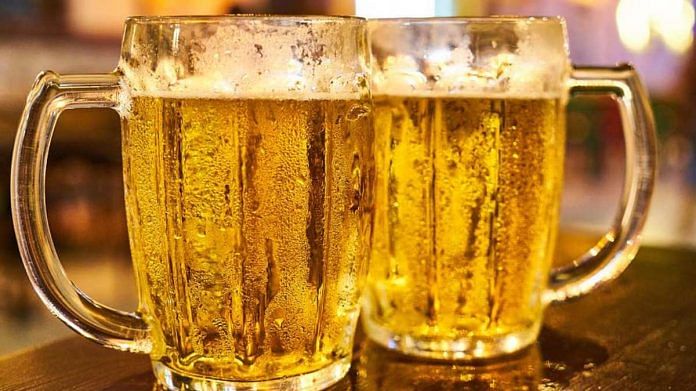
Lucknow: Individuals storing quantities of liquor larger than the ‘prescribed limit’ at home in Uttar Pradesh will now have to mandatorily acquire a licence from the state government that costs Rs 12,000 annually.
According to the state’s new excise policy, to be implemented from the coming financial year, strict action will be taken under the UP Excise Act against those who store alcohol in bulk for ‘home bars’ without a licence.
However, the new policy doesn’t specify what the prescribed limit is.
To acquire the licence, a sum of Rs 51,000 must be deposited with the excise department as security in addition to the licence fee of Rs 12,000.
Sanjay Bhusreddy, principal secretary of UP’s excise department, told ThePrint that the new policy has been put in place to stop people from opening a ‘mini bar’ at home. On several occasions, people in neighbourhoods of such ‘home bars’ have filed complaints with the police.
“We have drafted this new policy after keeping all such complaints/objections in our mind. Now a licence for all such ‘home bars’ have been made mandatory,” Bhusreddy said.
According to the newly drafted excise policy, applicants seeking licences for ‘home bars’ will have to submit an affidavit stating that entry of any unauthorised or any person under the age of 21 years will be barred from the place where the liquor is stored. Apart from this, no illegal or unauthorised liquor or any other intoxicating substance, other than the liquor valid under UP’s excise policy, can be stored at such places.
Getting a bar licence made simple
An official associated with the excise department said the process of issuing licences for bars has been simplified under the new policy.
The administrative process followed so far to grant approvals for liquor licences to hotels, restaurants, clubs, bars and airports is also being done away with. These approvals are to be now provided by the excise commissioner.
Until now, all applications for bar licences had to be submitted to the district magistrate (DM) concerned. The DMs would then forward it to the commissioner level after marking their own recommendations. After this, a bar committee would be constituted under the chairmanship of the commissioner, following which the file would go to the excise commissioner before finally reaching the principal secretary (excise).
The new policy also allows sale of foreign liquor in trains and cruises.
Subscribe to our channels on YouTube & Telegram
Why news media is in crisis & How you can fix it
India needs free, fair, non-hyphenated and questioning journalism even more as it faces multiple crises.
But the news media is in a crisis of its own. There have been brutal layoffs and pay-cuts. The best of journalism is shrinking, yielding to crude prime-time spectacle.
ThePrint has the finest young reporters, columnists and editors working for it. Sustaining journalism of this quality needs smart and thinking people like you to pay for it. Whether you live in India or overseas, you can do it here.